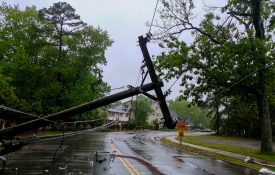-
Having a Strong Community Protects Adolescents From Risky Health Behaviors
Children who grow up in poverty have health problems as adults. But a new study finds that poor adolescents who live in communities with more social cohesiveness and control get some measure of protection; they're less likely to smoke and be obese as adolescents. The new study, published in Psychological Science, a journal of the Association for Psychological Science, is part of a long-term examination of children growing up poor in rural upstate New York. The study was designed to discover, "What is it about poverty that leads to these negative outcomes?" says lead author Gary W. Evans, of Cornell University.
-
Study Links Physical Activity to Political Participation
How is going for a jog like voting for president? As far as our brains are concerned, physical activity and political activity are two sides of the same coin. Scientists found that people who live in more active states are also more likely to vote. And in an experiment, volunteers who were exposed to active words like "go" and "move" said they were more likely to vote than did people who saw words like "relax" and "stop." The study was inspired by research showing that brains lump all kinds of activity together. For instance, a message that's meant to promote fitness—physical activity—can also trigger people to eat more—another kind of activity, and with the exact opposite result.
-
Cities try to cut the fat with weight-loss programs
Los Angeles Times: Ten pounds can seem like a hundred when you're trying to lose weight. So just think how Oklahoma City residents must feel. They're looking to lose a million. Across the country, mayors have been urging their citizens to downsize themselves. The goal in Philadelphia: Drop 76 tons of rotundity in 76 days. (Didn't happen.) In Louisville, Ky.: Pare off 100,000 pounds of pudge over a summer. (Didn't happen.) In Corpus Christi, Texas: Dispose of 50,000 pounds of avoirdupois in a year. (Could happen: This campaign is just getting started.) Read the whole story: Los Angeles Times
-
Children’s Genetic Potentials Are Subdued by Poverty
Children from poorer families do worse in school, are less likely to graduate from high school, and are less likely to go to college. A new study published in Psychological Science, a journal of the Association for Psychological Science, finds that these differences appear surprisingly early: by the age of 2. It's not a genetic difference. Instead, something about the poorer children's environment is keeping them from realizing their genetic potentials. Past research has found that a gap between poor children and children from wealthier families opens up early in life, even before children enter formal education.
-

Weighing the Costs of Disaster: Consequences, Risks, and Resilience in Individuals, Families, and Communities
A scientific review shows that a psychological intervention commonly employed to help victims who have just experienced a disaster lacks evidence supporting its effectiveness and may actually be harmful.
-
Centuries of Sailors Weren’t Wrong: Looking at the Horizon Stabilizes Posture
Everybody who has been aboard a ship has heard the advice: if you feel unsteady, look at the horizon. For a study published in Psychological Science, a journal of the Association for Psychological Science, researchers measured how much people sway on land and at sea and found there's truth in that advice; people aboard a ship are steadier if they fix their eyes on the horizon. Thomas A. Stoffregen of the University of Minnesota has been studying "body sway" for decades—how much people rock back and forth in different situations, and what this has to do with motion sickness.

